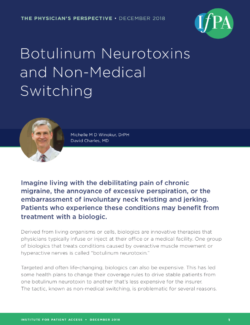New IfPA Policy Paper Warns about Non-Medical Switching of Botulinum Neurotoxins
December 13, 2018
 Patients with a range of conditions from chronic migraine to overactive bladder can achieve relief from a medication called a “botulinum neurotoxin.” But while some of these innovative biologics treat the same conditions, the medicines should not be substituted for one another.
Patients with a range of conditions from chronic migraine to overactive bladder can achieve relief from a medication called a “botulinum neurotoxin.” But while some of these innovative biologics treat the same conditions, the medicines should not be substituted for one another.
So explains IfPA’s newest policy brief, “Botulinum Neurotoxins and Non-Medical Switching.”
Authored by Michelle Winokur, DrPH and David Charles, MD, the paper explains that botulinum neurotoxins may vary in “dose, efficacy, duration of effect and immunogenicity.” In fact, the medicines carry a “non-interchangeability” clause, as required by the Food and Drug Administration.
That makes non-medical switching, when insurers compel patients and their physicians to switch from the botulinum neurotoxin they’ve been using to an insurer-preferred alternative, especially problematic. The brief details several potential challenges, including:
- Impact on the physician-patient relationship. The physician and patient develop a care plan together, determining which botulinum neurotoxin is best for that patient’s unique situation. Non-medical switching disregards their collective decision and “can create a rift in the physician-patient relationship.”
- Interrupted course of care. Forcing the change from one botulinum neurotoxin to another requires physicians to administer the starting dose of the new medicine, and to adjust the dosing and injection pattern over several treatment sessions. Non-medical switching also interrupts patients’ effective treatment regimen.
- Underdosing. Non-medical switching can lead to underdosing, which can keep patients from achieving the treatment’s intended benefit.
- Opportunity for errors. Switching between medicines challenges physicians, who are often more proficient with a single botulinum neurotoxin – which may or may not be the one preferred by a patient’s health plan.
The paper also reminds readers that non-medical switching can lead to higher health care expenditures. It cites 2017 research from the Institute for Patient Access that found patients who were subject to non-medical switching experienced “higher average non-drug costs downstream.”
Patients and their physicians have come to rely on their chosen botulinum neurotoxin to relieve painful, debilitating and, in some cases, embarrassing symptoms. This relief allows patients to fully live their lives – a priceless outcome that, as the policy paper concludes, shouldn’t be jeopardized by health plans’ cost cutting efforts.
For more information, read “Botulinum Neurotoxins and Non-Medical Switching.”
Tags: Biologics, Neurological, Non-Medical SwitchingCategorized in: Blog

